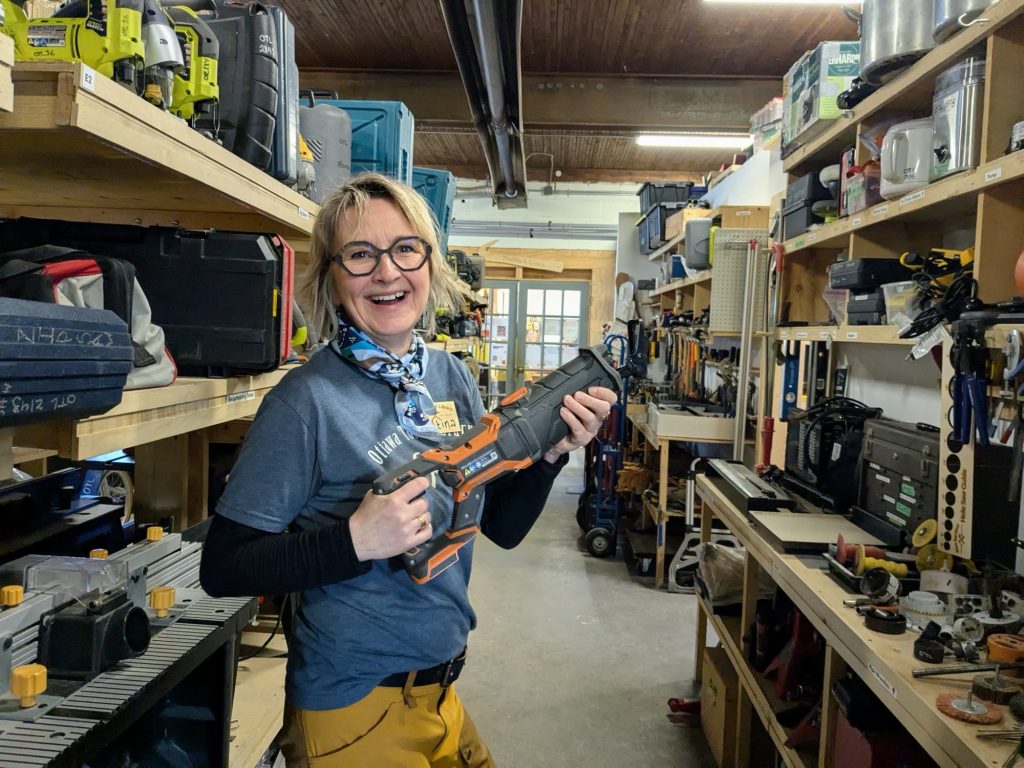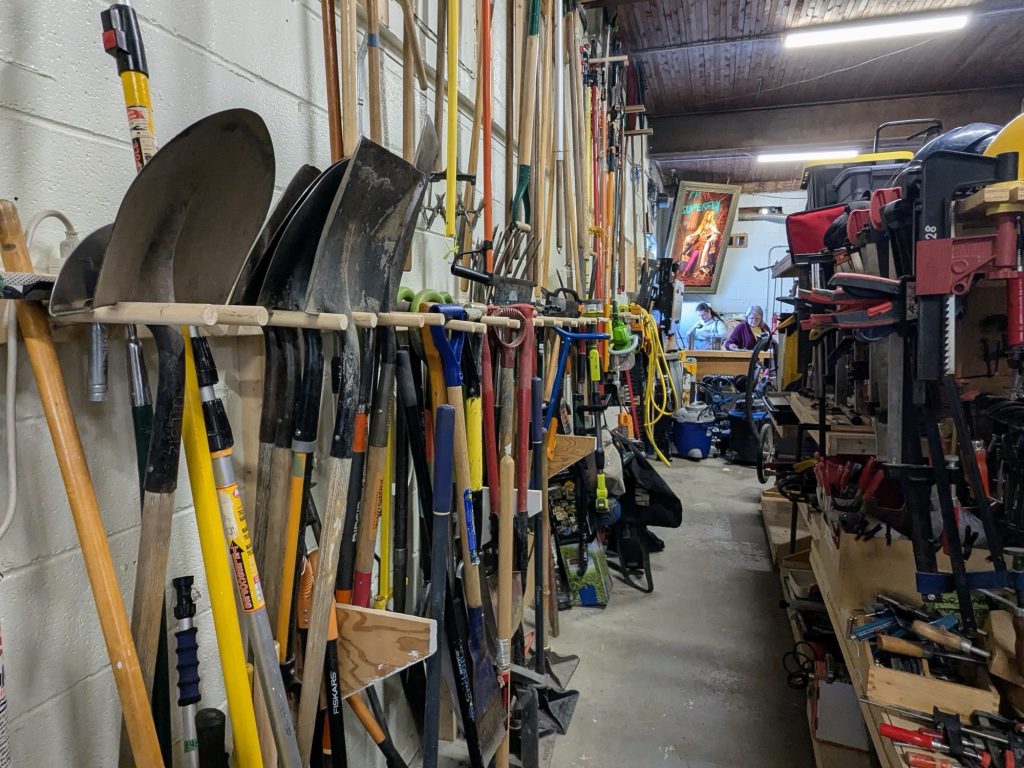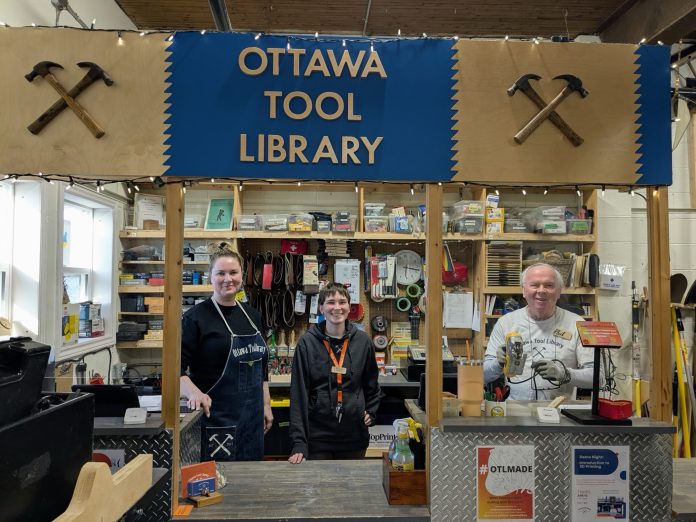In September of 2014, when Bettina Vollmerhausen and her friend Frederick were out for a drink, they had a lightning strike idea.
Frederick had just purchased a tile cutter in order to do a small renovation in his kitchen. While he knew he was unlikely to ever use it again, purchasing was cheaper than renting the item. Bettina brought up the idea of tool libraries, a concept they both were familiar with.
“I was like, what about tool libraries, and wouldn’t it be amazing if Ottawa had one?” recalled Vollmerhausen. “We had both heard about tool libraries, which are essentially libraries where you can borrow tools instead of books. It’s a movement that came out of the States in the ‘70s.”
Vollmerhausen goes on to discuss how our current urban communities perhaps aren’t as close as in times gone by or in more rural settings.
“When you think about it, it’s really how we used to live in our communities. We were closer, we knew each other. We knew that John had a ladder and Paul up the street had a lawn mower. And if you needed to borrow something, you go around and ask them for help and would also reciprocate,” she said. “But now that we live in big apartment buildings, you don’t know who is above you, below you.”

A few weeks after their conversation, Vollmerhausen had to go to Toronto. She found she had some free time and was able to squeeze in a visit to a tool library there, which convinced her even more that it could be done in Ottawa.
On the train ride home, Vollmerhausen started brainstorming. Another friend offered to make a website, and Vollmerhausen put together a proposal to be presented at Soup Ottawa – a micro-grant participatory dinner where individuals could present projects that benefit the community and then receive funds — generated from the $10 dinner fee — to support the project. Sadly, the organisation closed during the Covid-19 pandemic.
“We came really prepared. We had that rudimentary website, I brought a bunch of tools with a sign-up list, and throughout the evening people could come by the table to chat,” said Vollmerhausen. “At the end they voted, and ours had the most votes – so that evening we received $1300.00.”
Very quickly she and the team realised they would need a space other than her garage to house all the donations. In April 2015 they organised a crowdfunding campaign which exceeded their goal, allowing for the signing of a lease, and in the summer of 2015 they officially opened their doors to the public as the Ottawa Tool Library.
Run entirely by volunteers and funded through grants and membership fees, the current location at 877a Boyd Avenue is a dream for anyone who enjoys wandering the aisles of a hardware store. From hammers and screwdrivers to every power tool imaginable, as well as gardening or canning supplies, and even an ice cream maker, the Tool Library has many offerings — including beyond simply borrowing hardware.
“When we started the tool library, Frederick and I — and actually there was a core team quite quickly of 5-10 people — we wanted to make sure that not only were we a place to borrow resources,but also a place where you can learn,” said Vollmerhausen. ”So knowledge and skills were really important because people might want to borrow a table saw but they don’t know how to use it safely.”

The OTL offers their WorkSpace for patrons to work on DIY projects, with the option to rent tools if they wish to complete their project at home. In the name of safety, before you can start hammering and sawing, the tool library offers a mandatory WorkSpace 101 and 201 course which teaches the basics of tool operation, safety and protective practices, as well as measuring and planning your project.
Vollmerhausen also speaks passionately of the workshops and events the OTL offers, tying it all to the notion of a circular economy and the notion of “waste not, want not.”
“In 2017 we started holding Repair Cafes, a movement that came out of the Netherlands. It’s all about keeping items out of the landfill. We unfortunately live in an overconsumption society that produces and also consumes way too many resources. It’s all based on cheap, quick, easy, which ends up in the landfill,” she said. “So this movement was about keeping items in use and also for people to realise, Maybe I could spend a bit more, buy quality, and have it for longer, right?”
OTL holds Repair Cafes throughout Ottawa, traveling to different neighbourhoods every month. They bring 35-40 volunteers, of which 15-20 are fixers or menders. Members of the public can bring their toaster, their lamp, their curling iron, and a seasoned pro is available to lend their skills to repair the item.
Other programs the organisation offers are Workshops and Demo Nights that will help you build a planter box, will teach you basics of bike maintenance, or will offer tutelage in canning.
There is a Tinkering School, which the OTL website describes as providing “experiential learning opportunities for kids 9-12 years old with a focus on environmental education and activities that will teach tool skills for the next generation of do-it-yourselfers.”
And finally, there is an online web store of surplus tools available for purchase that have all been tested and tried by OTL’s in-house Tool Doctors.
“Now we’re open five times a week. We started with the lending library, which had 250 items at the beginning, and we are now over 3000. And this whole idea of giving people the opportunity to learn the skills, use the tools, came to fruition by starting the Workspace and then also all these Workshops,” said Vollmerhausen. ”We want to give you the skills so that you can use this space.”
